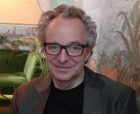David Martyn
Contact
German StudiesHumanities Building, Room 209 651-696-6374
651-696-6428 (fax)

Professor, German and Russian Studies
Focuses on comparative literature, literary theory, culture from the 18th century to the present, philosophy, and literature written in German by “foreign”-language authors
Humanities 211B
651-696-6547
martyn@macalester.edu
David Martyn, Professor (B.A. Yale Univ., M.A. and Ph.D. Cornell Univ.), teaches courses on German and European literature, philosophy, and critical theory. Recent and forthcoming course offerings include “Reading Marx,” “Freedom and Its Discontents,” “America Made in Europe,” “The Fairy Tale (Grimms to Disney),” “Our Cyborgs, Ourselves,” and “Introduction to Comparative Literature: Short Forms” (co-taught with Andrew Billing).
His publications include a book on Kant and Sade (Wayne State UP, 2003), a critical edition of Moses Mendelssohn’s 1783 treatise on Judaism and religious power (Aisthesis, 2001), articles on Kant, Marx, Adorno, and the 18th-century German-Jewish philosopher Salomon Maimon, and several co-edited books and journal issues on the history of the theory of the secular (Suhrkamp, 2020), the poetics of seriality, short forms in literature, and on the challenges faced by the notion of a shared common sense since the 18th century titled sensus non-communis. Recent articles include “Expropriating Antisemitism: Universal Noncommonality in Marx’s ‘On the Jewish Question” and “Anecdotal Remains: America or the Empiricism of Adorno’s Minima Moralia”; forthcoming are “On Power in an Extra-Secular Sense: Kant’s Sublime” (for the Cambridge Handbook on Kant and Literary Studies) and “Literarizität und Sprachigkeit: Zu Tomer Gardis broken german” (for the Schiller-Jahrbuch).
In 2011, Martyn was resident scholar at the Center for Literary and Cultural Studies in Berlin (ZfL) and the Friedrich Schlegel Graduate School for Literary Studies at the Free University of Berlin. In 2021, he was Mercator Visiting Professor at the DFG Graduate Training Group “Contemporary/Literature. History, Theory, and Praxeology of a Configuration” at the University of Bonn.